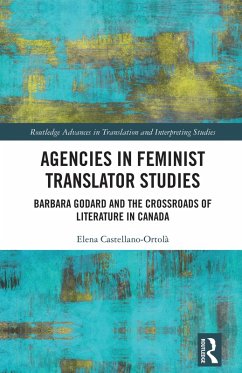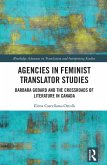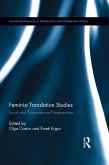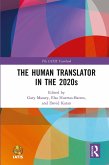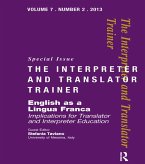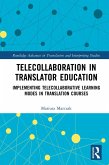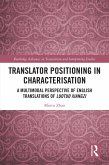Elena Castellano-Ortolà
Agencies in Feminist Translator Studies (eBook, PDF)
Barbara Godard and the Crossroads of Literature in Canada
41,95 €
41,95 €
inkl. MwSt.
Sofort per Download lieferbar

21 °P sammeln
41,95 €
Als Download kaufen

41,95 €
inkl. MwSt.
Sofort per Download lieferbar

21 °P sammeln
Jetzt verschenken
Alle Infos zum eBook verschenken
41,95 €
inkl. MwSt.
Sofort per Download lieferbar
Alle Infos zum eBook verschenken

21 °P sammeln
Elena Castellano-Ortolà
Agencies in Feminist Translator Studies (eBook, PDF)
Barbara Godard and the Crossroads of Literature in Canada
- Format: PDF
- Merkliste
- Auf die Merkliste
- Bewerten Bewerten
- Teilen
- Produkt teilen
- Produkterinnerung
- Produkterinnerung

Bitte loggen Sie sich zunächst in Ihr Kundenkonto ein oder registrieren Sie sich bei
bücher.de, um das eBook-Abo tolino select nutzen zu können.
Hier können Sie sich einloggen
Hier können Sie sich einloggen
Sie sind bereits eingeloggt. Klicken Sie auf 2. tolino select Abo, um fortzufahren.

Bitte loggen Sie sich zunächst in Ihr Kundenkonto ein oder registrieren Sie sich bei bücher.de, um das eBook-Abo tolino select nutzen zu können.
This book draws on the legacy of Canadian scholar Barbara Godard and her work in establishing the Canadian literary landscape as a means of exploring agency in feminist translation studies.
- Geräte: PC
- mit Kopierschutz
- eBook Hilfe
Andere Kunden interessierten sich auch für
![Agencies in Feminist Translator Studies (eBook, ePUB) Agencies in Feminist Translator Studies (eBook, ePUB)]() Elena Castellano-OrtolàAgencies in Feminist Translator Studies (eBook, ePUB)41,95 €
Elena Castellano-OrtolàAgencies in Feminist Translator Studies (eBook, ePUB)41,95 €![Feminist Translation Studies (eBook, PDF) Feminist Translation Studies (eBook, PDF)]() Feminist Translation Studies (eBook, PDF)43,95 €
Feminist Translation Studies (eBook, PDF)43,95 €![The Human Translator in the 2020s (eBook, PDF) The Human Translator in the 2020s (eBook, PDF)]() The Human Translator in the 2020s (eBook, PDF)41,95 €
The Human Translator in the 2020s (eBook, PDF)41,95 €![English as a Lingua Franca (eBook, PDF) English as a Lingua Franca (eBook, PDF)]() Stefania TavianoEnglish as a Lingua Franca (eBook, PDF)34,95 €
Stefania TavianoEnglish as a Lingua Franca (eBook, PDF)34,95 €![Telecollaboration in Translator Education (eBook, PDF) Telecollaboration in Translator Education (eBook, PDF)]() Mariusz MarczakTelecollaboration in Translator Education (eBook, PDF)41,95 €
Mariusz MarczakTelecollaboration in Translator Education (eBook, PDF)41,95 €![Working as a Professional Translator (eBook, PDF) Working as a Professional Translator (eBook, PDF)]() Jc PenetWorking as a Professional Translator (eBook, PDF)39,95 €
Jc PenetWorking as a Professional Translator (eBook, PDF)39,95 €![Translator Positioning in Characterisation (eBook, PDF) Translator Positioning in Characterisation (eBook, PDF)]() Minru ZhaoTranslator Positioning in Characterisation (eBook, PDF)41,95 €
Minru ZhaoTranslator Positioning in Characterisation (eBook, PDF)41,95 €-
- -31%11
-
This book draws on the legacy of Canadian scholar Barbara Godard and her work in establishing the Canadian literary landscape as a means of exploring agency in feminist translation studies.
Dieser Download kann aus rechtlichen Gründen nur mit Rechnungsadresse in A, B, BG, CY, CZ, D, DK, EW, E, FIN, F, GR, HR, H, IRL, I, LT, L, LR, M, NL, PL, P, R, S, SLO, SK ausgeliefert werden.
Produktdetails
- Produktdetails
- Verlag: Taylor & Francis
- Seitenzahl: 206
- Erscheinungstermin: 16. April 2024
- Englisch
- ISBN-13: 9781040017166
- Artikelnr.: 70087944
- Verlag: Taylor & Francis
- Seitenzahl: 206
- Erscheinungstermin: 16. April 2024
- Englisch
- ISBN-13: 9781040017166
- Artikelnr.: 70087944
- Herstellerkennzeichnung Die Herstellerinformationen sind derzeit nicht verfügbar.
Elena Castellano-Ortolà is an associate lecturer in the Department of English and German Studies at the Universitat de València. A former postdoctoral fellow, she also collaborates regularly with the Université Bordeaux-Montaigne.
Contents
Part 1: Cross-Disciplinary Feminisms: Towards Feminist Translator Studies
1. Introduction. Feminisms, disciplinary politics, and translation: Defying knowledge
1.1 A Feminist stance on the (re-)production of knowledge
1.2. Feminisms, disciplinary politics and translation
1.3. A feminist, agency-driven view on translation (history)
2. Feminist Translator Studies: A Cross-Disciplinary Hub
2.1. Feminist Translator Studies: Agency, discursiveness
2.2. Towards Feminist Translator Studies
2.3. Critical Discourse Methodologies for Feminist Translator History: Feminist Translation as a Form of FCDA
3. Telling the narrator's tale: The legacy of Barbara Godard's agency
3.1. The narrator
3.2. The tale
Part 2: A Feminist Translator's Portrait: Barbara Godard's agency at the crossroads of literature in Canada
4. Arrival at York University: In the chinks of the Canada Council machine
4.1. Establishment? A point of departure
4.2. "English-Canada's New Wild West": Québec's Rebellious Literary Search for Identity
4.3. Intercultural Canada? The Literary Translators Association (LTAC)
4.4. Stagnation?
4.5. Arrival at York University: The Canada Council Years
4.6. Godard's Tale of Don L'Orignal (1978): Channeling Maillet's Roman Acadien
5. Breaking into academia: The golden age of Canadian-feminist translation
5.1. "Roman national or récit féminin?": The reception of a literary (Feminist) Québécois Identity
5.2. Feminist Criticism as the first truly transnational Canadian dialogue
5.3. The Golden Age of Canadian-Feminist Translators
5.4. L'amèr (1977) and These Our Mothers (1984): Godard's First Approximation to Brossard's Fiction Theory
6. Passing on The Mission: New Questionings
6.1. Self-Criticism: The emergence of Canadian (Literary) Translation Studies
6.2. Collaboration, Polyphony: Translation becomes self-conscious feminist activism
6.3. Loose ends
6.4. Overture: The Last Academic Voices of Canadian-Feminist Translation
6.5. "Je déparle yes I unspeak": A collaborative translation of Lola Lemire Tostevin's bilingual feminist poetry (1989)
Part 3: Future directions
7. Feminisms, Nation, Translation: Barbara Godard's Periplum and the fate of Canadian Feminist Translation Studies
7.1. Decline of the Canadian dream
7.2. Divergence in the CanLit ranks: (Im-)Possibilities of the Woman/Nation Binomial
8. Un-Charting The future of the dialogue between translators and feminisms
8.1. Prospects: Disciplinary politics and (Translative) Feminisms
Index
Part 1: Cross-Disciplinary Feminisms: Towards Feminist Translator Studies
1. Introduction. Feminisms, disciplinary politics, and translation: Defying knowledge
1.1 A Feminist stance on the (re-)production of knowledge
1.2. Feminisms, disciplinary politics and translation
1.3. A feminist, agency-driven view on translation (history)
2. Feminist Translator Studies: A Cross-Disciplinary Hub
2.1. Feminist Translator Studies: Agency, discursiveness
2.2. Towards Feminist Translator Studies
2.3. Critical Discourse Methodologies for Feminist Translator History: Feminist Translation as a Form of FCDA
3. Telling the narrator's tale: The legacy of Barbara Godard's agency
3.1. The narrator
3.2. The tale
Part 2: A Feminist Translator's Portrait: Barbara Godard's agency at the crossroads of literature in Canada
4. Arrival at York University: In the chinks of the Canada Council machine
4.1. Establishment? A point of departure
4.2. "English-Canada's New Wild West": Québec's Rebellious Literary Search for Identity
4.3. Intercultural Canada? The Literary Translators Association (LTAC)
4.4. Stagnation?
4.5. Arrival at York University: The Canada Council Years
4.6. Godard's Tale of Don L'Orignal (1978): Channeling Maillet's Roman Acadien
5. Breaking into academia: The golden age of Canadian-feminist translation
5.1. "Roman national or récit féminin?": The reception of a literary (Feminist) Québécois Identity
5.2. Feminist Criticism as the first truly transnational Canadian dialogue
5.3. The Golden Age of Canadian-Feminist Translators
5.4. L'amèr (1977) and These Our Mothers (1984): Godard's First Approximation to Brossard's Fiction Theory
6. Passing on The Mission: New Questionings
6.1. Self-Criticism: The emergence of Canadian (Literary) Translation Studies
6.2. Collaboration, Polyphony: Translation becomes self-conscious feminist activism
6.3. Loose ends
6.4. Overture: The Last Academic Voices of Canadian-Feminist Translation
6.5. "Je déparle yes I unspeak": A collaborative translation of Lola Lemire Tostevin's bilingual feminist poetry (1989)
Part 3: Future directions
7. Feminisms, Nation, Translation: Barbara Godard's Periplum and the fate of Canadian Feminist Translation Studies
7.1. Decline of the Canadian dream
7.2. Divergence in the CanLit ranks: (Im-)Possibilities of the Woman/Nation Binomial
8. Un-Charting The future of the dialogue between translators and feminisms
8.1. Prospects: Disciplinary politics and (Translative) Feminisms
Index
Contents
Part 1: Cross-Disciplinary Feminisms: Towards Feminist Translator Studies
1. Introduction. Feminisms, disciplinary politics, and translation: Defying knowledge
1.1 A Feminist stance on the (re-)production of knowledge
1.2. Feminisms, disciplinary politics and translation
1.3. A feminist, agency-driven view on translation (history)
2. Feminist Translator Studies: A Cross-Disciplinary Hub
2.1. Feminist Translator Studies: Agency, discursiveness
2.2. Towards Feminist Translator Studies
2.3. Critical Discourse Methodologies for Feminist Translator History: Feminist Translation as a Form of FCDA
3. Telling the narrator's tale: The legacy of Barbara Godard's agency
3.1. The narrator
3.2. The tale
Part 2: A Feminist Translator's Portrait: Barbara Godard's agency at the crossroads of literature in Canada
4. Arrival at York University: In the chinks of the Canada Council machine
4.1. Establishment? A point of departure
4.2. "English-Canada's New Wild West": Québec's Rebellious Literary Search for Identity
4.3. Intercultural Canada? The Literary Translators Association (LTAC)
4.4. Stagnation?
4.5. Arrival at York University: The Canada Council Years
4.6. Godard's Tale of Don L'Orignal (1978): Channeling Maillet's Roman Acadien
5. Breaking into academia: The golden age of Canadian-feminist translation
5.1. "Roman national or récit féminin?": The reception of a literary (Feminist) Québécois Identity
5.2. Feminist Criticism as the first truly transnational Canadian dialogue
5.3. The Golden Age of Canadian-Feminist Translators
5.4. L'amèr (1977) and These Our Mothers (1984): Godard's First Approximation to Brossard's Fiction Theory
6. Passing on The Mission: New Questionings
6.1. Self-Criticism: The emergence of Canadian (Literary) Translation Studies
6.2. Collaboration, Polyphony: Translation becomes self-conscious feminist activism
6.3. Loose ends
6.4. Overture: The Last Academic Voices of Canadian-Feminist Translation
6.5. "Je déparle yes I unspeak": A collaborative translation of Lola Lemire Tostevin's bilingual feminist poetry (1989)
Part 3: Future directions
7. Feminisms, Nation, Translation: Barbara Godard's Periplum and the fate of Canadian Feminist Translation Studies
7.1. Decline of the Canadian dream
7.2. Divergence in the CanLit ranks: (Im-)Possibilities of the Woman/Nation Binomial
8. Un-Charting The future of the dialogue between translators and feminisms
8.1. Prospects: Disciplinary politics and (Translative) Feminisms
Index
Part 1: Cross-Disciplinary Feminisms: Towards Feminist Translator Studies
1. Introduction. Feminisms, disciplinary politics, and translation: Defying knowledge
1.1 A Feminist stance on the (re-)production of knowledge
1.2. Feminisms, disciplinary politics and translation
1.3. A feminist, agency-driven view on translation (history)
2. Feminist Translator Studies: A Cross-Disciplinary Hub
2.1. Feminist Translator Studies: Agency, discursiveness
2.2. Towards Feminist Translator Studies
2.3. Critical Discourse Methodologies for Feminist Translator History: Feminist Translation as a Form of FCDA
3. Telling the narrator's tale: The legacy of Barbara Godard's agency
3.1. The narrator
3.2. The tale
Part 2: A Feminist Translator's Portrait: Barbara Godard's agency at the crossroads of literature in Canada
4. Arrival at York University: In the chinks of the Canada Council machine
4.1. Establishment? A point of departure
4.2. "English-Canada's New Wild West": Québec's Rebellious Literary Search for Identity
4.3. Intercultural Canada? The Literary Translators Association (LTAC)
4.4. Stagnation?
4.5. Arrival at York University: The Canada Council Years
4.6. Godard's Tale of Don L'Orignal (1978): Channeling Maillet's Roman Acadien
5. Breaking into academia: The golden age of Canadian-feminist translation
5.1. "Roman national or récit féminin?": The reception of a literary (Feminist) Québécois Identity
5.2. Feminist Criticism as the first truly transnational Canadian dialogue
5.3. The Golden Age of Canadian-Feminist Translators
5.4. L'amèr (1977) and These Our Mothers (1984): Godard's First Approximation to Brossard's Fiction Theory
6. Passing on The Mission: New Questionings
6.1. Self-Criticism: The emergence of Canadian (Literary) Translation Studies
6.2. Collaboration, Polyphony: Translation becomes self-conscious feminist activism
6.3. Loose ends
6.4. Overture: The Last Academic Voices of Canadian-Feminist Translation
6.5. "Je déparle yes I unspeak": A collaborative translation of Lola Lemire Tostevin's bilingual feminist poetry (1989)
Part 3: Future directions
7. Feminisms, Nation, Translation: Barbara Godard's Periplum and the fate of Canadian Feminist Translation Studies
7.1. Decline of the Canadian dream
7.2. Divergence in the CanLit ranks: (Im-)Possibilities of the Woman/Nation Binomial
8. Un-Charting The future of the dialogue between translators and feminisms
8.1. Prospects: Disciplinary politics and (Translative) Feminisms
Index
